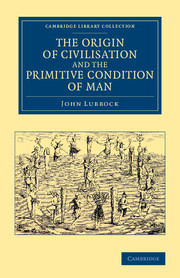
-
Select format
-
- Publisher:
- Cambridge University Press
- Publication date:
- 05 October 2014
- 23 January 2014
- ISBN:
- 9781107109933
- 9781108068499
- Dimensions:
- Weight & Pages:
- Dimensions:
- (216 x 140 mm)
- Weight & Pages:
- 0.52kg, 412 Pages
You may already have access via personal or institutional login
Book description
Though professionally a banker and politician, John Lubbock (1834–1913) is best remembered for his scientific writings. As a boy, he was tutored by his father's friend, Charles Darwin, in natural history. He went on to make contributions to archaeology, anthropology and entomology. In this illustrated anthropological treatise, Lubbock applies evolutionary theory to the development of human civilisations, outlining the progression from ancient forms of art, relationships, religion, ethics, language and law to their counterparts in the present day. He argues that the social structures of ancient cultures can be interpreted through interaction with contemporary primitive cultures. Published in book form in 1870, the material for this work was first delivered as a lecture series at the Royal Institution. Lubbock's Pre-historic Times as Illustrated by Ancient Remains, and the Manners and Customs of Modern Savages (1865), in which he coined the terms Palaeolithic and Neolithic, is also reissued in this series.
Contents
Metrics
Altmetric attention score
Full text views
Full text views help Loading metrics...
Loading metrics...
* Views captured on Cambridge Core between #date#. This data will be updated every 24 hours.
Usage data cannot currently be displayed.
Accessibility standard: Unknown
Why this information is here
This section outlines the accessibility features of this content - including support for screen readers, full keyboard navigation and high-contrast display options. This may not be relevant for you.
Accessibility Information
Accessibility compliance for the PDF of this book is currently unknown and may be updated in the future.


